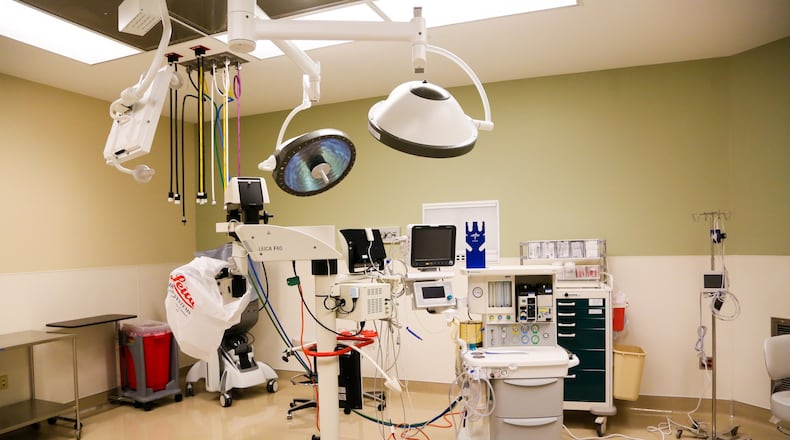Here are 5 of the newest medical technologies and services available in a short drive:
1. CEI Middletown Surgery Center
Located near Atrium Medical Center, Cincinnati Eye Institute's ambulatory surgery center offers a full range of services that include cataract, glaucoma, cornea, oculoplastic and retina surgery. Patients will no longer having to go to CEI's Ambulatory Surgery Center at its Blue Ash campus or CEI surgeries at various hospitals throughout the Cincinnati area.
“As you look at the growing population in Cincinnati and the growing importance of the I-75 corridor in the Cincinnati-Dayton market, we know there’s a huge population growth in that area and we’ve committed to serving that population,” said Dr. Daniel Miller, CEI’s chief medical officer.
CEI’s clinical offices at 5950 Innovation Drive more than double the space for the institute and pushing it to recruit additional opthamologists and sub-specialists to provide care to the community.
2. Diabetes care through Fort Hamilton Hospital
Kettering Health brought Kettering Physician Network’s Endocrinology & Diabetes to the Hamilton Health Center in downtown Hamilton in late 2015.
Endocrinology is the medical specialty addressing disorders of the endocrine system. The endocrine system is responsible for the production of hormones, which control metabolism and development.
“Prior to this, patients had to travel out of Butler County to see a Kettering Physician Network endocrinologist,” said Kettering Health Network spokeswoman Elizabeth Long. “The closest was at Southview Medical Center in Centerville.
MORE: New medical facility planned at former skating rink in Hamilton
In addition, Kettering Health Network plans to build a medical facility on land it purchased at 1391 W. Main St. in Hamilton. The nearly 1.5-acre property sold Aug. 15 for $950,000. Although plans for the facility are still being finalized, it is expected to include physician offices and outpatient services.
3. Natural birth services
Atrium Medical Center recently became is the first hospital in the Cincinnati market to offer natural birth services, starting to offer them via Natural Beginnings Birth Center in December 2016. Renovations wrapped up in the spring. and in May, two natural birthing suites opened and feature queen sized beds, built-in jacuzzi tubs and more space for a family-friendly experience.
Previously, expecting Cincinnati mothers would have had to travel out of market for natural birth services in an acute care setting.
“By adding natural birth services at Atrium in Middletown, we’ve brought services closer to home, meeting the needs for our patients and their families in the Cincinnati-Dayton region,” said Lori Scalise, vice president of service integration for Premier Health, the health system that operates Atrium Medical Center.
MORE: Area reaps gains from medical building boom
4. Minimally-invasive surgery
Earlier this year, Mercy Health-Fairfield Hospital became the first hospital in Butler County to have the da Vinci Xi Surgical System, the newest and most advanced robot used in minimally-invasive surgery
The device allows doctors to perform surgical procedures for a wide range of complex conditions through 1- to 2-centimeter incisions.
MORE: Fairfield hospital performs first surgery with new robot device
5. Headache pain management, epilepsy monitoring
UC Health in 2016 launched the UC Headache and Facial Pain Center at West Chester Hospital to help eliminate or reduce head and facial pain, according to spokeswoman Kristy Davis.
“We are the only Cincinnati health system with four certified headache physicians, and care for more headache patients than any other center in the region,” Davis said.
Davis said UC Health West Chester Hospital also plans to introduce an Epilepsy Monitoring Unit for in-patient services, which will use 24-hour EEG monitoring to diagnose and target seizures.
“Our imaging specialists use advanced brain-imaging techniques to locate seizures,” Davis said. “Then they map brain areas that control language, motor and memory functions, making surgery safer and more effective.”
About the Author

